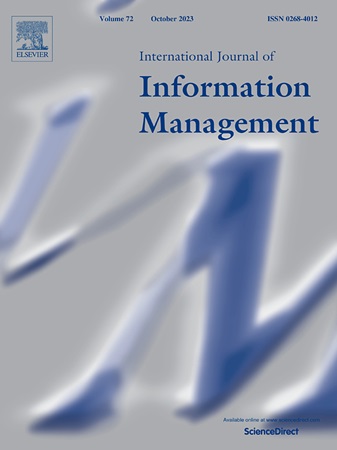数字广告中的个人数据策略:第一方数据能否超越第三方数据?
IF 27
1区 管理学
Q1 INFORMATION SCIENCE & LIBRARY SCIENCE
International Journal of Information Management
Pub Date : 2024-11-12
DOI:10.1016/j.ijinfomgt.2024.102852
引用次数: 0
摘要
谷歌在探索新的个人数据战略时,希望在加强隐私保护和保持个性化之间取得平衡,确保在负责任地处理消费者数据的同时,仍能提供相关的个性化广告。本研究以隐私计算框架为基础,采用混合方法来实现两个关键目标:1)根据所使用的数据类型,了解不同程度的个性化如何影响广告效果;以及 2)探索消费者对使用不同类型个人数据的个性化广告的潜在反应机制。为实现第一个研究目标,研究 1 将对 25 家广告商调查数据的层次分析法(AHP)分析与对一家欧洲美容公司广告数据的计量经济学分析相结合。为实现第二个研究目标,研究 2 通过深度访谈和在线调查探讨了消费者的看法。本研究的主要结论如下。AHP 分析表明,广告商优先考虑第一方数据,尤其是购买历史数据,以加强个性化定位。计量经济学分析表明,虽然第三方数据目前在提高广告效果方面最为有效,但随着广告政策的不断变化,第一方数据已成为一种有前途的替代选择。定性和定量分析揭示了个性化水平、数据类型和消费者反应之间复杂的互动关系,凸显了个性化收益与风险之间的矛盾。这些见解为广告商、平台和政策制定者驾驭不断变化的数字广告和个人数据隐私提供了宝贵的指导。本文章由计算机程序翻译,如有差异,请以英文原文为准。
Personal data strategies in digital advertising: Can first-party data outshine third-party data?
As Google explores new personal data strategies, it aims to strike a balance between enhancing privacy and maintaining personalization, ensuring that consumers' data is handled responsibly while still delivering relevant and personalized advertising. This study, based on the privacy calculus framework, employs a mixed-methods approach to address two key objectives: 1) understanding how different levels of personalization impact advertising performance based on the type of data utilized, and 2) exploring the underlying mechanism of consumer reactions to personalized advertising using different types of personal data. To achieve the first research goal, Study 1 integrates Analytic Hierarchy Process (AHP) analysis of survey data from 25 advertisers with econometric analysis of advertising data from a European beauty company. To achieve the second research objective, Study 2 explores consumer perceptions through in-depth interviews and an online survey. The key findings of this study are as follows. The AHP analysis revealed that advertisers prioritize first-party data, especially purchase history, for enhancing personalized targeting. The econometric analysis suggested that while third-party data is currently most effective for enhancing advertising performance, first-party data emerges as a promising alternative in light of evolving advertising policies. Qualitative and quantitative analyses revealed complex interactions between personalization levels, data types, and consumer responses, highlighting the tension between personalization benefit and risk. These insights provide valuable guidance for advertisers, platforms, and policymakers in navigating the changing landscape of digital advertising and personal data privacy.
求助全文
通过发布文献求助,成功后即可免费获取论文全文。
去求助
来源期刊

International Journal of Information Management
INFORMATION SCIENCE & LIBRARY SCIENCE-
CiteScore
53.10
自引率
6.20%
发文量
111
审稿时长
24 days
期刊介绍:
The International Journal of Information Management (IJIM) is a distinguished, international, and peer-reviewed journal dedicated to providing its readers with top-notch analysis and discussions within the evolving field of information management. Key features of the journal include:
Comprehensive Coverage:
IJIM keeps readers informed with major papers, reports, and reviews.
Topical Relevance:
The journal remains current and relevant through Viewpoint articles and regular features like Research Notes, Case Studies, and a Reviews section, ensuring readers are updated on contemporary issues.
Focus on Quality:
IJIM prioritizes high-quality papers that address contemporary issues in information management.
 求助内容:
求助内容: 应助结果提醒方式:
应助结果提醒方式:


